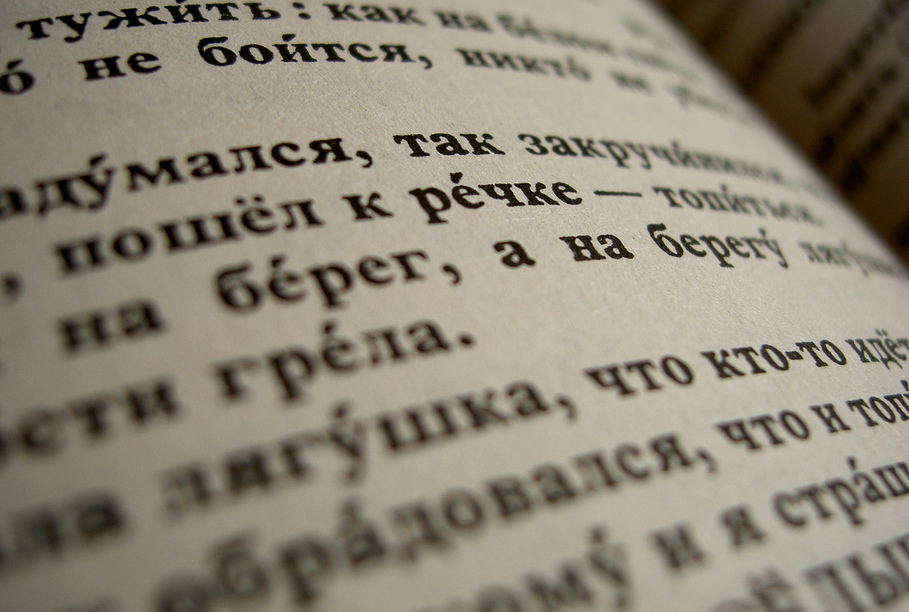This has been something of a personal mystery to me, or rather a source of narcissistic pride, and while it diminishes my pleasure in writing this, I am forced to admit there are many people like me in Latvia–and it's interesting, because...
Latvian and Russian aren't really very similar
The question of the similarities between Latvian and Russian, if it is asked in good faith, is certainly interesting and merits a thoughtful response. I would just like to state that, throughout this article, I will absolutely sidestep politics and ideology, unless it is funny.
This should give at least some idea of the considerable differences between the languages.
But consider this too: Latvian and Russian have different alphabets (they are written differently); Latvian has long vowels, but Russian doesn't (they sound different); Latvian has more declensions, but Russian has the neuter case, which is missing in Latvian (the grammar, the way the language puts things together, including verbs, is different).
Nevertheless, both languages are inflected. Some of the vocabulary is similar. Verb endings are, too.
Comparing the two, people usually say there are many church words, like baznīca (old Russian: божница, church) that have connections, which have come into Latvian via historical ties... but that's a bit boring.
Rather, let us set our sights on the heart of the matter.
Latvian and Russian bodies
They have a similar heart (sirds, сердце), arms (rokas, руки), nails (nagi, ногти), and the head (galva, голова).
What is the Latvian face (seja) is something slightly lower down the body in Russian (the neck - шея), and what wonderful synecdoche have the Russians played on the nose (нос), which is but a nostril (nāss) in Latvian!
Most of the body remains, however, strikingly and irrevocably divided between the Slavic and Baltic.
The mother tongue... comes from the mother. My mother holds me on her lap, klēpis, but the Russian mother cradles her infant on her knees (на коленях).
Despite this difference, there is something you recognize about the Russian lady.
It's something good.
Learning is a love story
When I was much younger, I came to be enamored with a Russian television character. Lady of indubitable honor, lady of the military she was, as seen on Four tank-men and a dog, a series made in the 60s and broadcast on LNT commercial television in Russian in the late 90s or early 2000s.
Lady of great wisdom she was too, as it was she who burst open the floodgates of my mind to let the Russian tongue enter and settle, with the white-on-grey-background subtitles acting as an intermediary.
That the series was actually made in Poland and that it was pro-Soviet is beside the point. At the time I was still too young to hold a cycling license.
Rise of the robots
But to listen is not enough. One must also read, because reading is magic. If anyone knows this fact, it's the Latvians. Burts (a letter) is the past passive participle of burt (to do sorcery).
The first word I read in Russian was not, however, a magical word. It was not even a pretty one. Работники, workers, is the first word I remember reading in Russian. Nothing to do with Lenin, however: the word appeared to me in Caesar III, a city-building game my mother and I enjoyed playing on the computer. A notice popped up on the screen, signalling, I knew, that the city needed more workers.
"Mother," I told her, "You are running out of pagoroksi." This is how I read the word работники (rabotnekee - notice that б, the Russian b, looks like an inverted g).
Mother burst out laughing and told everyone in the family, and the neighbors too.
Then she taught me the Cyrillic alphabet.
At university
It is sad the academic connections between us have disappeared, says the professor, woman of great mind and determination, who studied classics in Moscow. A sentimental being she was too -- did she become so from her stay in the east? She was looking out of the window on a pristine blue autumn evening, and tears flew across her cheeks.
I am sad about this too. It is a shame we know less and less Russian.
But it is good we have more choice in the matter.































